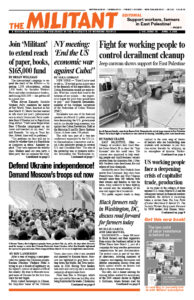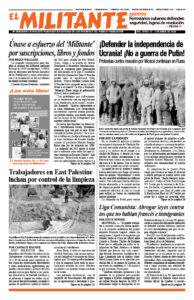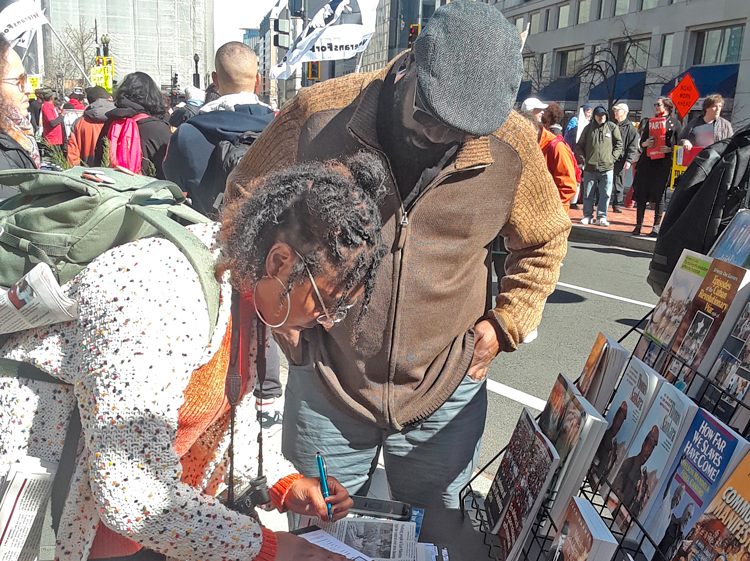WASHINGTON — Socialist Workers Party members found interest in the party’s program and activities when they campaigned at a March 18 “Fund people’s needs, not the war machine” protest across from the White House.
The action was called by a coalition of Stalinist and radical groups that claim the Kremlin’s attempt to crush Ukraine is a “proxy war” between Moscow and Washington. Their aim is to mobilize sentiment against imperialist war in the U.S. in order to strengthen forces in capitalist politics that want to see Washington back off support for Ukraine and to pressure the Ukrainian government to abandon the fight to defend the country’s independence.
But the march organizers largely promoted the action as a peace protest that commemorated the 20th anniversary of Washington’s murderous 2003 invasion of Iraq. Some 1,000 people attended, including workers and youth looking for ways to express their opposition to the U.S. imperialists’ wars — past and future — and open to discussing what it will take to overturn their rule.
Jacob Cudmore and Scott Stohlman, students at Salisbury University in Maryland, stopped by the SWP table. Cudmore said his father was in the Marines during the Iraq War. “Saddam Hussein was a bad guy, but that war was fought for the rich,” he said. “There need to be talks today to stop the war in Ukraine.”
“To discuss Moscow’s invasion of Ukraine, working people need a different starting point — the right of the Ukrainian nation to exist,” I replied. “And the need to fight for Moscow to withdraw immediately to advance the common interests of working people in Russia and Ukraine.”
“The invasion was immoral,” Stohlman said. “Russia should withdraw.” He pointed out the U.S. government was using the war to advance its own interests.
“We need to take power out of the hands of the capitalist war makers in this country,” I said. “The working class is the only force that can do that.”
Both students had been following the devastation facing working people in East Palestine, Ohio, following the derailment of a Norfolk Southern train carrying toxic chemicals. “There’s hundreds of derailments across the country,” Stohlman said.
“This happens because rail bosses have cut thousands of jobs,” explained Chris Hoeppner, SWP candidate for mayor of Philadelphia and a freight rail worker.
“Trump deregulated the railways and then Biden banned rail workers from striking,” Cudmore added. “Democrats and Republicans both look after corporate interests.”
“Both parties were afraid of rail workers going on strike,” Hoeppner said. “They fear the power of working people.” He described how he and co-workers used their contract fight to get out the truth to fellow workers and other unionists about the increasingly dangerous conditions they confront.
“Workers need a labor party based on the unions,” Hoeppner said. Both Cudmore and Stohlman got subscriptions to the Militant and the book The Low Point of Labor Resistance Is Behind Us: The Socialist Workers Party Looks Forward by SWP leaders Jack Barnes, Mary-Alice Waters and Steve Clark.
Navy veteran Tanesha Stebb was visiting D.C. from Louisiana when she saw the march go by. “I came to see the cherry blossoms but I had to join the march,” she said. Now working as a photographer, Stebb said she was disgusted by the contempt for human life displayed by U.S. forces that she witnessed during her deployment to the Middle East.
SWP member Willie Cotton showed her Malcolm X, Black Liberation, and the Road to Workers Power, also by Barnes. He pointed to the book’s description of the powerful fight by toilers in the South for Radical Reconstruction governments after the overthrow of slavery in the Second America Revolution — the Civil War. Cotton described the accomplishments of those governments and their overthrow by the ruling capitalist class. Stebb got the book and a subscription to the Militant.
“We want the U.S. to withdraw its forces from Korea,” Soobok Kim told the Militant. He was part of a contingent of Koreans on the march. “Last Monday the U.S. began Freedom Shield military exercises with South Korea, including B-1 bombers.” Washington’s provocative actions carry a constant threat of war on the Korean Peninsula. These exercises are the largest in five years.
Two Russians opposed to Moscow’s invasion also joined the march. Eleven subscriptions to the Militant and 18 books by SWP leaders and other revolutionaries were sold from our table. It was a good place to meet young people looking for a working-class road forward.


